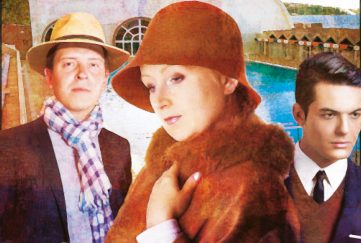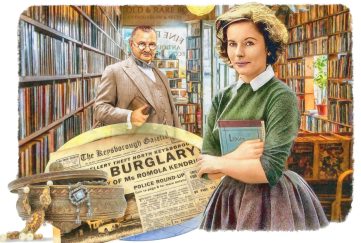A Quiet Honeymoon – Episode 04

THE following day, Terence and Ruth did not revisit Brakenham. They knew that Mary Greville’s fianc would be there, spending the day trying to comfort her, and that the local police would be doing their work.
They took an omnibus to Bosham Harbour, and looked at the boats, enjoying the sunshine but talking all the while about Mr Quirk, his mysterious anxieties, or his secret, and whether Mr Greville might have been at home the day before.
“Was Mr Quirk a large man?” Ruth asked. “I only glanced at that dreadful sight.”
“Quite the opposite,” Terence said. “He was slight. Bony, even.”
“He might easily have moved Quirk from the garden and into the lane. He’s tall.”
“Leaving the body there might make it appear that the violence was random, unconnected with the house. But why not move him further away?”
“He could easily have done so, if the murder happened in the dead of night.”
“But why,” Terence asked, “kill him at all?”
On their walk they passed an iron seat, which overlooked the wide harbour. A young man sat there, his head buried in his hands, and when they were a few feet beyond the seat, Ruth heard him let out a sob.
“Can I help you?” She turned.
“I know she never threw herself in,” the young man said, his voice scratchy with emotion. “She never would. We were only married a year ago, out in India.”
Terence and Ruth exchanged a glance of pity. Both knew that this man must be the husband of the poor dead girl in the newspaper. Ruth sat quietly beside him.
“I am sorry. She was so young.”
“Twenty-one,” he said. “I was worried when she didn’t come home we’re in Clapham now.” His face snapped round to face Ruth. “There was a paragraph in ‘The Times’ about a woman drowned, and it said Bosham. I knew my Mary had come down here. She said she needed a few days away, and she had a picture in her things a drawing of the villages round about here. She used to look at it often. It came from her family; I knew that much. So I came this morning. And it was her, my darling, that they found in the water.” He burst into tears.
Terence, standing on the other side of him from Ruth, laid a hand on the man’s shoulder, and after a while Ruth spoke.
“Why did your wife travel alone?”
“She said she was going to have a look for someone. I let her go, and now I’ll never know who she wanted to discover.”
He looked up at Terence.
“Are you married?” he asked.
Terence nodded. The man gazed at Ruth.
“You’ll know your wife’s every mood, then,” he whispered, “like I knew mine. I knew she was expecting a child.” His head went into his hands, and his next words were muffled. “My girl, and my child,” he said. He looked up. “But she never drowned herself. Tell them that,” he said. “Tell them.”
Ruth and Terence stayed with the young man for an hour longer, hearing him pour out his anger and distress, before giving him the name of their boarding house.
He told them that he had returned from India a few months previously, where he had met his Mary. He had been a clerk in a colonial office, and she a superior maid to a diplomat’s wife. They both wanted to come home to Britain now that they were married. But it had ended in disaster.
















